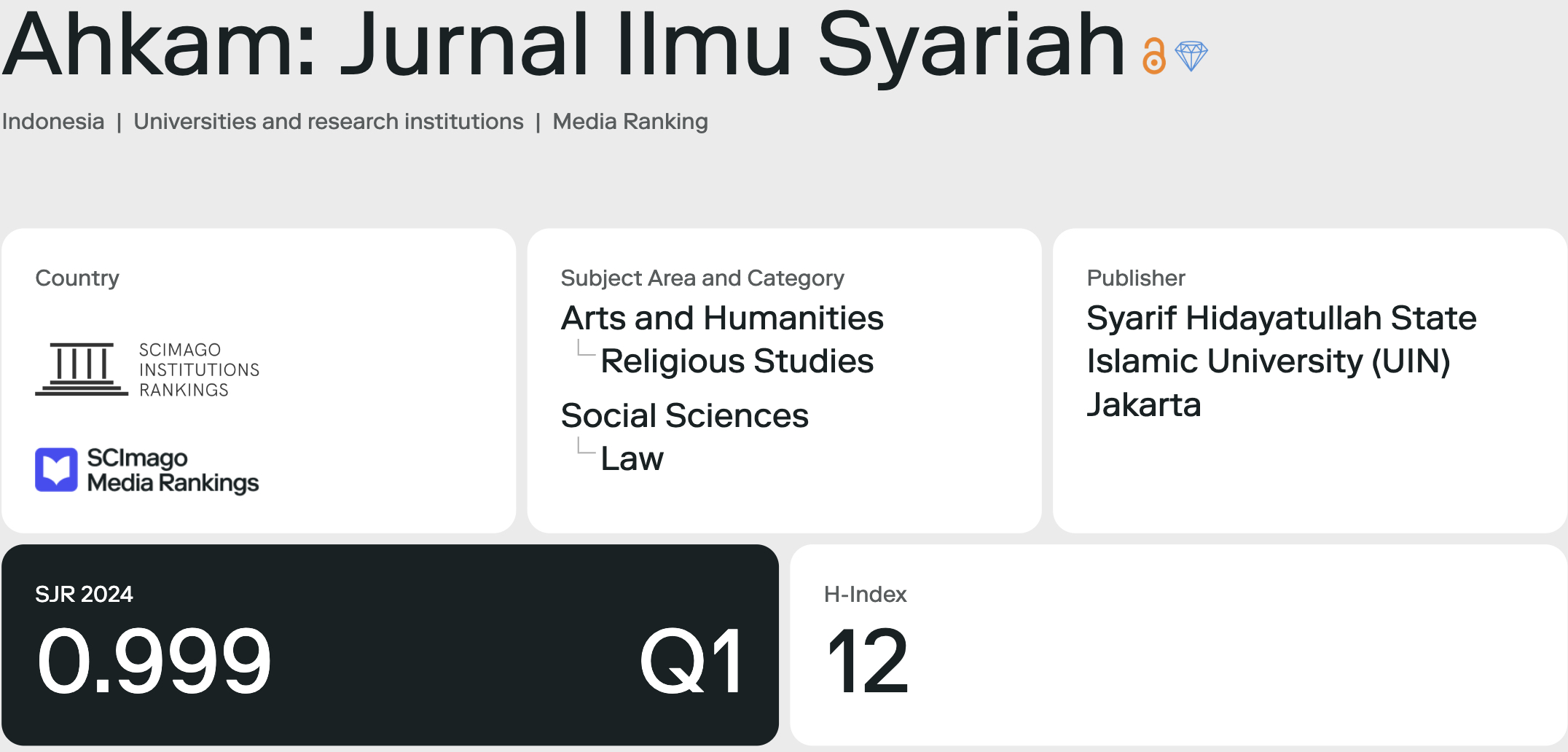Woman and Fatwa: an Analytical Study of MUI’s Fatwa on Women’s Health and Beauty
DOI:
https://doi.org/10.15408/ajis.v24i1.37832Keywords:
Fatwa, Influence of Islamic schools of thought, Fatwas on women in Indonesia, Indonesian Ulema CouncilAbstract
This study examines the fatwas on women’s health and beauty issued by the Indonesian Ulema Council (MUI), explicitly investigating the influence of particular madhhab on these fatwas. This influence will be evaluated in MUI’s fatwas on women’s health and beauty, including fatwas on menstrual suppression pills, abortion, female circumcision, plastic surgery, and botox injections for beauty and care. The doctrinal approach of legal research is applied to analyze the use of Islamic legal sources and arguments. This study shows that although the majority of Indonesian Muslims follow the Shafi’i school, MUI does not solely adhere to the Shafi’i school in formulating its fatwas. Instead, MUI also employs approaches from other madhhab, such as Hanafi, Maliki, and Hanbali. As various MUI’s fatwas have provided broad guidelines for the community, fatwas on women significantly influence the legal basis for government policies.
Abstrak: Kajian ini mengkaji fatwa-fatwa kesehatan dan kecantikan perempuan yang dikeluarkan oleh Majelis Ulama Indonesia (MUI) serta secara eksplisit menyelidiki pengaruh mazhab tertentu terhadap fatwa-fatwa tersebut. Fatwa MUI yang dikaji menyangkut tentang kesehatan dan kecantikan perempuan, termasuk fatwa tentang pil penekan menstruasi, aborsi, sunat perempuan, operasi plastik, dan suntik botox untuk kecantikan dan perawatan. Pendekatan penelitian hukum doktrinal diterapkan untuk menganalisis penggunaan sumber dan argumentasi hukum Islam. Kajian ini menunjukkan bahwa meskipun mayoritas umat Islam di Indonesia menganut mazhab Syafi’i, namun MUI tidak semata-mata menganut mazhab Syafi’i dalam merumuskan fatwa-fatwanya. Sebaliknya, MUI juga menggunakan pendekatan dari mazhab lain, seperti Hanafi, Maliki, dan Hanbali. Karena fatwa-fatwa MUI tersebut memberikan pedoman yang luas bagi masyarakat, maka fatwa tentang perempuan sangat mempengaruhi dasar hukum kebijakan pemerintah.
References
Al-Andalūs, M. bin Y. al-S. A. H. (n.d.). Tafsīr Baḥr al-Muḥīṭ. Dār al-Kutub al-Ilmiyyah.
Al-Fiqhiyyah, A.-M. (1990). Al-Mawsū’ah al-Fiqhiyyah. Wizārah al-Awqāf wa al-Shu’un al-Islāmiyyah,.
Al-Ghazālī. (2004). Iḥya’ ‘Ulūm al-Dīn. Dār al-Ḥadīth.
Al-Jazīrī, A. R. (1999). Kitāb al-Fiqh ‘alā al-Madhāhib al-Arba’ah. Dār al-Kutub al-Ilmiyyah.
Al-Nadawi, A. (2004). al-Qawā’id al-Fiqhiyyah.
Al-Nadawi, A. A. (2004). Principles of Islamic Jurisprudence. Dār al-Qalam.
Al-Nawawī. (2001). Saḥih Muslim bi Sharḥ al-Nawāwī. al-Maktab al-Tsaqafī.
Al-Qaradawi, Y. (1955). Fatwa-Fatwa Kontemporer (G. I. Press, Ed.).
Al-Qaradawi, Y. (2013). 100 Tanya Jawab Haji dan. Al-Kautsar.
Al-Qarāfi. (1998). al-Furūq Anwar al-Burūq fī Anwā’i al-Furūq. Dār al- Kutub al-Ilmiyyah.
Amin, A.R.M. (2024). Problematic Fatwa: An In-Depth Sociological Investigation of MUI’s Fatwa on Supporting Palestine’s Struggle. 7(1). El-Usrah: Jurnal Hukum Keluarga, 7 (1) http://dx.doi.org/10.22373/ujhk.v7i1.22020
Anas, M. bin. (n.d.). Al-Muwatta (Cairo, Ed.). Dār al-Hadīth.
Dana, D. (2021). Perkembangan Hukum Islam di Indonesia: Konsep Fiqih Sosial dan Implementasinya dalam Hukum Keluarga. El-Usrah: Jurnal Hukum Keluarga, 4 (1). http://dx.doi.org/10.22373/ujhk.v4i1.8780
Djazuli, H. A. (2007). Principles of Islamic Jurisprudence: Principles of Islamic Law in Resolving Practical Issues. Kencana.
Esposito, J. L. (1998). Islam the Straight Path. Oxford University Press.
Fadlullah, S. M. H. (2000). Women’s World. Lentera Publishing.
Fatwa Majelis Ulama Indonesia Nomor 4 Tahun 2005 Tentang Aborsi (2005).
Hamzah, M. M. (2018). Peran dan Pengaruh Fatwa MUI dalam Arus Transformasi Sosial Budaya di Indonesia. Millah: Journal of Religious Studies, 127–154. https://doi.org/10.20885/millah.vol17.iss1.art7
Hasyim, S. (2023). The Shariatisation of Indonesia The Politics of the Council of Indonesian Ulama. Brill.
Ibnu, ’Ābidīn. (n.d.). Majmū’ah Rasāil Ibnu ‘Ābidīn; al-Ilmu al-Ẓāhir fī Naf’i al-Nasab al-Ṭaḥīr.
Imārah, M. (2002). al-Taḥrīr al-Islāmī li al-Mar’ah al-Radd ‘alā Shubhāt al-Ghulāt. Dār al-Shurūq.
Jamaa, L. (2018). Fatwas of the Indonesian Council of Ulama and its Contributions to the Development of Contemporary Islamic Law in Indonesia. Indonesian Journal of Islam and Muslim Societies, 8(1), 29. https://doi.org/10.18326/ijims.v8i1.29-56.
Japhet, Naisiligaki, (2022), Grassroots Muslim women in religious conflict prevention in Tanzania: roles, contributions, and challenges, IJoReSH : Indonesian Journal of Religion, Spirituality, and Humanity (1) (2), pp. 147 – 166.
Johar, A. F. (2018). Kekuatan Hukum Fatwa Majelis Ulama Indonesia (MUI) dari Perspektif Peraturan Perundang-Undangan di Indonesia.
Khallāf, A. W. (1981). Ilmu Uṣūl al-Fiqh. Dār al-Qalam.
Kozin, W. (2004). Study on the Role of the Indonesian Ulema Council in Religious Harmony. Jakarta: Thesis, University of Indonesia, 2004. Univesitas Indonesia.
Naqib, H.M. at.al. (2021). The Application of Maqasid-Oriented Approach in Islamic Bioethics: A Case Study on Fatwa Related to Cosmetic, Plastic and Reconstructive Surgery. IIUM Medical Journal Malaysia, 20(1). https://doi.org/10.31436/imjm.v20i1.1781
Mu’ā’shirah, F. S. (n.d.). Muḥammad Ibrahīm al-Ḥafnawī. Dār al-Hadith.
Mudzhar, M. A. (2022). The Use of Legal Maxims in the Fatwas of Indonesian Ulama Council. Indo Islamica Jurnal Kajian Interdisipliner Islam Indonesia, 12(1), 1–11. https://doi.org/https://doi.org/10.15408/jii.v12i1.24343
MUI. (2011). Himpunan Fatwa MUI sejak 1975. Erlangga.
MUI Fatwa Number 21 on Botox Injection for Beauty and Treatment.
Nashif, F. U. (1992). Ḥuqūq al-Mar’ah wa Wājibatuhā fī Ḍaw’i al-Kitāb wa al-Sunnah. Matb’ah al-Madānī.
Putra, D. (2019). Konsep ‘Urf dan Implementasinya pada Ihdad Wanita Karie. El-Usrah: Jurnal Hukum Keluarga, 4 (1). http://dx.doi.org/10.22373/ujhk.v2i2.7576.
Pratiwi, A. Z. (2018). Ḥukm Isti’mālil Ḥubūbī al-Haydī li al-Mar’ah ‘Inda Manāsik al-Ḥajj. MAQASHID Jurnal Hukum Islam, 1(1), 72–93. https://doi.org/10.35897/maqashid.v1i1.127
Qudāmah, A. M. A. ibn A. ibn. (1997). Al-Mughnī. Dār al-Kutub.
Regulation of the Minister of Health of the Republic of Indonesia Number: 1636/Menkes/Per/XI/2010 Concerning Female Circumcision. Chapter II, Article 2, Paragraph 1. (2010).
Ristiani, M., Ruli, N., and Dian, P. (2003). Female Circumcision: Between Tradition and Religious Teachings. UGM and Ford Foundation.
Shaleh, AF Hasanuddin, M. A. N. (2021). Dinamika Fatwa MUI. Penerbit Republika.
Sholeh, M. A. N. (2012). Fatwa MUI tentang Khitan Perempuan. AHKAM : Jurnal Ilmu Syariah, 12(2). https://doi.org/10.15408/ajis.v12i2.964
Syatar, Bakry, Abdul Muammar, Ali Rusdi Bedong, M., Baso Pallawagau, Ahmad, (2023) The Development of Fatwas Based on Local Wisdom To The National Level: A Case Study of Panaik Money Fatwa , El-Mashlahah Volume (13) (2), p. 133-150.
The Eradication of Domestic Violence. (2004).
Yanggo, H. T. (2013). Family Law in Islam. Yayasan Masyarakat Indonesia Baru.
Zaydān, A. K. (2000). al-Mufassal fī Aḥkām al-Mar’ah wa Bayt al-Muslim. Muassasah al-Risālah.








